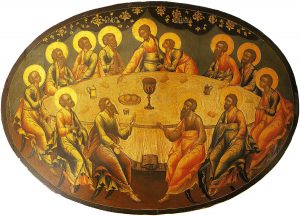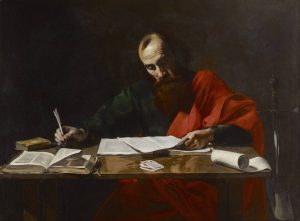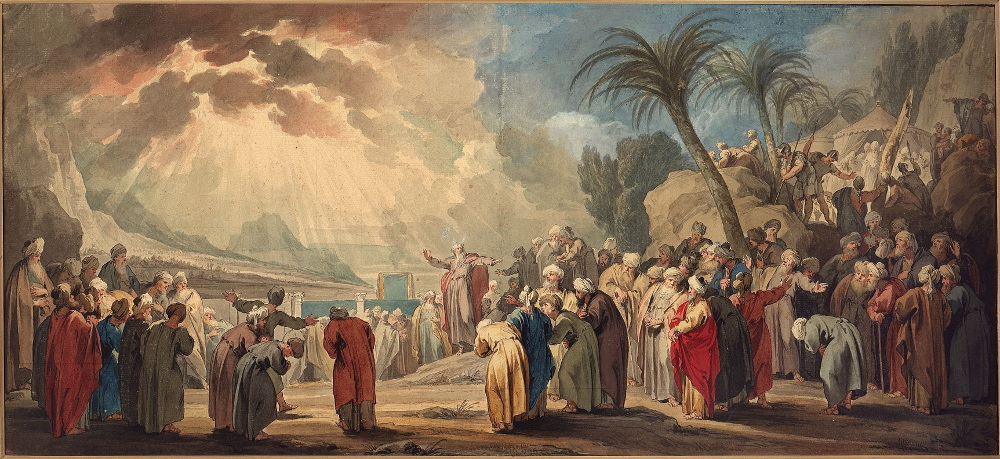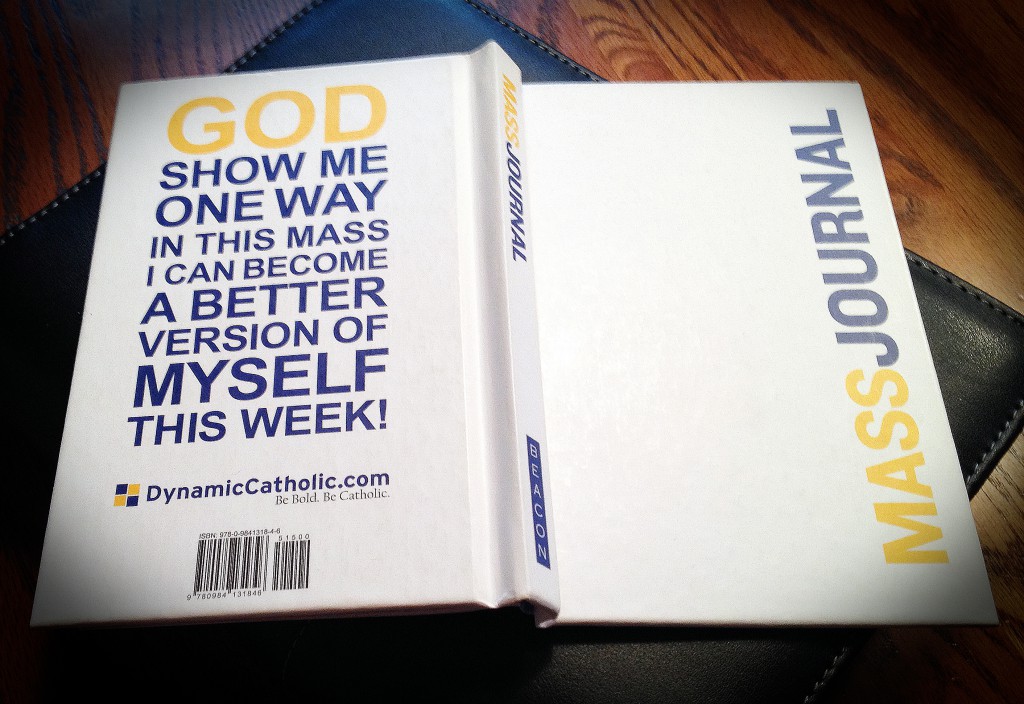 What’s your favourite prayer during Mass? Do you have one? Matthew Kelly says his favourite prayer is Deliver us, Lord, we pray, from every evil, graciously grant peace in our days, that, by the help of your mercy, we may be always free from sin. For him, that one phrase, free from sin, has so much meaning. He says, “I want to live a life free from sin, and the prayer keep us free from sin resonates with the deepest desires of my heart… The truth is, the happiest times of my life have been when I was actively trying to live free from sin” (Rediscover Catholicism, 213-4).
What’s your favourite prayer during Mass? Do you have one? Matthew Kelly says his favourite prayer is Deliver us, Lord, we pray, from every evil, graciously grant peace in our days, that, by the help of your mercy, we may be always free from sin. For him, that one phrase, free from sin, has so much meaning. He says, “I want to live a life free from sin, and the prayer keep us free from sin resonates with the deepest desires of my heart… The truth is, the happiest times of my life have been when I was actively trying to live free from sin” (Rediscover Catholicism, 213-4).
My favourite prayer is the consecration, when the priest repeats the words of Jesus at the first Mass, the Last Supper. These words tell me so much about Jesus and His love for us and for me; it’s like reading a love letter. All you have to do is insert your name into it: “Take this, Justin, and eat of it, for this is my Body, which will be given up for you.” Even if we were the only ones to live, Jesus would still have died for us. Because Jesus is God, while at the Last Supper and while dying on the cross, He could keep in mind every single person who ever lived, and die for that person.
When we get to the consecration of the chalice, Jesus says, “Take this, all of you, and drink from it, for this is the chalice of my Blood, the Blood of the new and eternal covenant, which will be poured out [For whom?] for you and for many [Why?] for the forgiveness of sins.”
The word covenant is also packed with meaning. Scott Hahn teaches that a covenant is so much more than a contract. The difference between the two is like the difference between marriage and prostitution. There are four differences: 1) A contract is made with promise, while a covenant is made with an oath; 2) A contract is signed in our name, while a covenant is signed in God’s name; 3) Contracts exchange goods and services, while covenants exchange persons; 4) Contracts are temporary, while covenants are permanent (A Father Who Keeps His Promises, 24, 26, 29).
The prayer of consecration is packed with meaning, and the Church actually wants us to grasp this, which is why she asks priests to slow down and say the words deliberately, and why even the text is in capitals. Someone asked the question: “What should we think about during the consecration?” Everything that I’ve just explained is what I think about. All these ideas come to me when I pronounce them during Mass.
What I’d like us to realize is that God speaks through the prayers at Mass, not just during the homily and readings, but through the prayers, and through the hymns.
 I know I caught everyone off guard at the beginning of Mass when I used the optional greeting, Grace to you and peace from God our Father and the Lord Jesus Christ. Normally I say The Lord be with you. Admittedly, I never used today’s greeting simply because I didn’t understand and appreciate it, but I decided to use it because we heard it in the second reading. St. Paul uses it eight times in his letters, and a shorter form in two other letters, while St. Peter’s letters and Revelation also use it. The point? This is how the first Christians said, “Hello,” to each other. Notice also the strange word order: “Grace to you and peace.” It’d be more natural to say, “Grace and peace to you,” right? But this is the word order in the original Greek, and it’s maintained in the Latin and then into the English. Well, some believe that it was perhaps a secret code used to identify bona fide Catholics during times of persecution (Msgr. Bruce Harbert, Companion to the Order of Mass, 8-9).
I know I caught everyone off guard at the beginning of Mass when I used the optional greeting, Grace to you and peace from God our Father and the Lord Jesus Christ. Normally I say The Lord be with you. Admittedly, I never used today’s greeting simply because I didn’t understand and appreciate it, but I decided to use it because we heard it in the second reading. St. Paul uses it eight times in his letters, and a shorter form in two other letters, while St. Peter’s letters and Revelation also use it. The point? This is how the first Christians said, “Hello,” to each other. Notice also the strange word order: “Grace to you and peace.” It’d be more natural to say, “Grace and peace to you,” right? But this is the word order in the original Greek, and it’s maintained in the Latin and then into the English. Well, some believe that it was perhaps a secret code used to identify bona fide Catholics during times of persecution (Msgr. Bruce Harbert, Companion to the Order of Mass, 8-9).
 And “just as there is no ordinary greeting, there is no ordinary response” (Msgr. James P. Moroney, The Mass Explained, 42-3). The idea of And with your spirit is used four times by St. Paul. It recognizes that the priest, through his ordination, has been anointed by the Holy Spirit to act in the person of Christ. Just as the spirit came down upon the seventy elders to help Moses rule the Israelites, and upon the sons of Aaron to offer sacrifice, priests are given the spirit to offer Jesus’ sacrifice with you and for you. “This dialogue will be repeated by the priest and people each time the priest is about to pray [at the start of Mass and at the beginning of the Eucharistic Prayer] or bless [at the end of Mass] or proclaim on their behalf [at the Gospel].” You’re reminding the priest that what he does isn’t by his own power (Harbert, 15).
And “just as there is no ordinary greeting, there is no ordinary response” (Msgr. James P. Moroney, The Mass Explained, 42-3). The idea of And with your spirit is used four times by St. Paul. It recognizes that the priest, through his ordination, has been anointed by the Holy Spirit to act in the person of Christ. Just as the spirit came down upon the seventy elders to help Moses rule the Israelites, and upon the sons of Aaron to offer sacrifice, priests are given the spirit to offer Jesus’ sacrifice with you and for you. “This dialogue will be repeated by the priest and people each time the priest is about to pray [at the start of Mass and at the beginning of the Eucharistic Prayer] or bless [at the end of Mass] or proclaim on their behalf [at the Gospel].” You’re reminding the priest that what he does isn’t by his own power (Harbert, 15).
Here are four other explanations of Mass prayers:
1) I have greatly sinned during the penitential rite is taken from the words of David when he sinned by taking a census of the people (1 Chr 21:8) (It was a sin because it was a sign of pride, i.e., to find out how big his kingdom had become, and against trust in God, because he was trusting more in numbers than in God.). After he sinned, he confessed, “I have greatly sinned.” So this is the idea we can have when we say these words.
Someone asked, “Do we really have to strike our breast during the general confession [penitential rite]? What if I feel bad enough already without ‘beating myself up’ about it?” Striking our breast comes from Luke 18, where Jesus tells a parable about the Pharisee and the tax collector who go up to the Temple to pray. The former stands and says, “God, I thank thee that I am not like other men, extortioners, unjust, adulterers, or even like this tax collector.” The latter “standing far off, would not even lift up his eyes to heaven, but beat his breast, saying, `God, be merciful to me a sinner!’” Jesus says that he went home justified. When we beat our breasts, therefore, we’re not doing it because we hate ourselves, but only because it’s a Biblical way of showing sorrow.
2) The Holy, Holy, Holy comes from Isaiah 6, in which the prophet has a vision of God in the temple: He sees God seated on a throne, with angels (seraphim) above Him, and the angels are calling one to another, “Holy, holy, holy, is the Lord of hosts; the whole world is full of his glory.” Then the place shakes and is filled with smoke (like incense) (Harbert, 48-9). And what does “Hosts” mean? “Armies.” In Revelation, angels fight against the devil and his armies.
3) Whenever we use the title Lamb of God during Mass, we should think of the scene of St. John the Baptist standing on the bank of the Jordan river baptizing his followers. He sees Jesus coming toward him, and says, “Behold, the Lamb of God, who takes away the sin of the world” (Jn 1:29). He had been waiting 30 years for this! And we’re supposed to have the same enthusiasm when we say it.
4) When we say, Lord, I am not worthy that you should enter under my roof, but only say the word, and my soul shall be healed, this refers to the Roman centurion who asked Jesus to heal his servant. He wasn’t even a Jew, but had faith in Jesus. So he sends elders of the Jews to ask Jesus to come and heal his servant. But when he learns that Jesus is on His way, he send friends to Jesus and says, “Lord, do not trouble yourself, for I am not worthy to have you come under my roof; therefore I did not presume to come to you. But say the word, and let my servant be healed” (Lk 7:6-7). He felt so unworthy that he didn’t presume to go to Jesus or have Him come to his house. Yet his faith was so strong that he knew Jesus could heal his servant from a distance merely by saying a word. And Jesus remarks, “I tell you, not even in Israel have I found such faith” (Lk 7:9). We’re supposed to feel just as unworthy to receive Jesus in Communion, but, because He loves us and His mercy is so great, He wants to come to us, and, whatever our problems, we just have to believe He can heal them and our souls will be healed.
 Again, God speaks to us not only through the homily and readings at Mass, but also through the prayers. We just have to listen. So I’d like to suggest Matthew Kelly’s brilliant idea of having a Mass journal. He suggests we bring a journal to Mass and ask one question, “God, show me one way in this Mass I can become a better version of myself this week?” Jesus says, “Ask, and it will be given to you, seek and you will find, knock and the door will be open to you” (Mt 7:7). When we don’t ask, we won’t receive. Why? Because we’re not open.
Again, God speaks to us not only through the homily and readings at Mass, but also through the prayers. We just have to listen. So I’d like to suggest Matthew Kelly’s brilliant idea of having a Mass journal. He suggests we bring a journal to Mass and ask one question, “God, show me one way in this Mass I can become a better version of myself this week?” Jesus says, “Ask, and it will be given to you, seek and you will find, knock and the door will be open to you” (Mt 7:7). When we don’t ask, we won’t receive. Why? Because we’re not open.
The parish has ordered 500 Mass journals from Dynamic Catholic and they’re available for $5. All we have to do is bring our journal to Mass, pray to hear that one thing, and when you’ve got it, write it down. It might be from the readings, the homily, the prayers, or the music. Kelly says, “It is usually fairly simple things that God says to me: ‘Avoid using negative humor.’ ‘Cherish your wife.’ ‘Take time each day to be grateful.’ ‘What are you holding back from God?’” (Rediscover Catholicism, 199), or ‘I love you.’ We write it at the top of the page, date it, ponder it and live it out. Then later on we can go back to these words that God has given us.
Sometimes people say to me, “Good homily,” (it doesn’t happen often) and I ask, “What did you like about it?” and they won’t know what to say. What’s the point of having a good homily if we can’t remember it and it doesn’t translate into something life-giving and practical? Writing one message from the Mass will help us remember because writing by hand helps us store and internalize ideas in the long haul; it helps us learn.
This goes back to a centuries’ old Catholic spiritual practice of working on one thing a day. Imagine if all of us remembered and tried to live out one thing from Mass, we’d have 52 pieces of encouragement or challenge every year. That’s a game-changer! Imagine the conversations we could have if we asked each other, “What did God say to you today?”
Next week is Christmas, when we celebrate our Lord’s birth. It’s time for a new spiritual birth with regard to our approach to the Mass. A Mass journal is an effective way to do this.
I believe there’s only one reason that will keep us from doing this: we’re sometimes hesitant about trying something new because there’s a part in all of us that doesn’t like to be different. “What will people think? Will they think I’m becoming super religious? Will they look over and see what I write?” Let’s all agree that we’ll never look over at what someone else writes. If people want to share, it’s up to them. And if we’re worried about what other people think, let’s work on self-possession.
I’ve been thinking about keeping a Mass journal for a long time, and now is the time to start. Let’s do this together so that we can be attentive to God’s voice.
If you don’t yet have a favourite prayer at Mass, just listen and you will. God speaks through the prayers at Mass.